Mary Anne Yarde's Blog: The Coffee Pot Book Club , page 136
May 31, 2019
Book Review — Blood and Destiny (The Shadow of the Raven #1) by Chris Bishop #HistoricalFiction #AngloSaxon @CBishop_author

Blood and Destiny(The Shadow of the Raven #1)By Chris Bishop
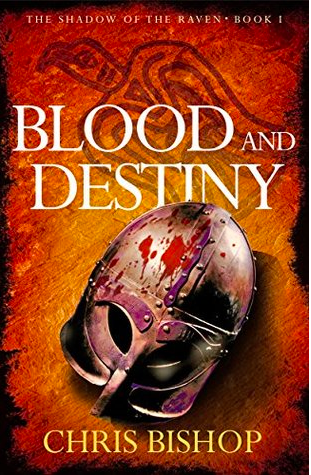
It is 878 and Wessex stands alone against Guthrum's Viking hordes as all England cowers beneath their raven banner.
With most of his army destroyed following a surprise attack at Chippenham, Alfred King of Wessex, retreats to the desolate marshes at Athelney. Whilst few believe he can ever restore the kingdom, he remains determined – no matter the cost.
Among the small band of weary survivors is Matthew, a novice monk who must learn to fight like a warrior if he, along with his brother and fellow Saxons, are to have any chance of defeating the Vikings. As the impending battle looms, Matthew is charged with a vital role that means he must face danger and betrayal, and undertake a hazardous journey during which his faith will face the ultimate test.

“The day is lost, but whilst yet a single Saxon warrior survives the war is not yet over.”
Alfred may well have been caught unawares in his Vill in Chippenham, but he will not relinquish his crown without one more fight and nor will he abandon his beloved Wessex. And if he has to hold his royal court in the wild marshes at Athelney, then he will do so. He will not bow down to Guthrum and his Great Army. Alfred will fight until the very bitter end. May God have mercy on their souls.
Matthew, a young novice monk, had not walked in the shadow of death until now. He is a long way from the Abbey in Winchester, and sometimes it feels like he is a world away from God. He is no warrior. Matthew had never thought he would be in a position where he would witness a battle, let alone steal a life. And yet, the invading Vikings demand that he takes up the sword and defend his country and his King, no matter what that means for him.
Alfred may command loyalty, but there is a traitor in his camp. Matthew has his suspicions, but how do you accuse a great man, a great warrior, who is reverently respected by all he meets, of disloyalty and, worse still, murder. Matthew must tread carefully and keep his wits about him. If he does not, then the only thing that awaits him is a quick death.
Blood and Destiny (The Shadow of the Raven #1) by Chris Bishop is the captivating tale, told from the viewpoint of a young novice monk, about the desperately heroic struggle of Alfred the Great against the Great Heathen Army led by Guthrum.
If you have been looking for a book that is filled with not only personal but political conflict, set in a vividly drawn ninth-century England, then consider your search well and truly over! Blood and Destiny is everything you could want in a story about King Alfred and then some.
Alfred is on the brink of losing everything, including his life. Thrown into this bitter war for supremacy and survival is a young unworldly novice monk, who sees things he wishes he had never seen and who has done things that makes him question everything he thought he knew about himself. Matthew is an unlikely hero in this battle-heavy tale. He is a character that is deeply torn between duty to his King and his love for God. Matthew is a very gentle soul who is forced to fight for not only his own survival but for those who he cares about as well. He struggles terrible with his own guilt about the blood he has shed, and also the distance he feels from God. He is incredibly conflicted, which made his character not only very believable but very real in the telling. I liked him very much, and the journey he goes on, not only in the physical but in the spiritual as well, made this book exceedingly compelling.
Bishop’s masterful style pulled me into the story from the very first sentence. His impressive narrative and his authentic historical detailing has to be commended. Bishop lavishly evokes the land in which his story is set — it really did feel like I had stepped back in time and was witnessing the battle for Wessex first hand. Every aspect of this book has been thoroughly researched – there are no glaring inaccuracies, nor is there any out-of-place vocabulary. Blood and Destiny is a real treat for lovers of quality Historical Fiction.
I thought the comparison between the Saxon Army and the Viking one, is also worthy of note. Although Bishop has portrayed the Vikings as raiding savages, which from the Saxon viewpoint they were, he does not shy away from some of the less noble Saxon decisions, and he makes the reader stop and ask, were the two armies really that different to begin with? Alfred is an honourable man, but there was an incident with a slave, changing the course of her life, that made me question his honour, which I thought was very cleverly done. Alfred was not portrayed as a saintly king, but one who is fighting a war and will do anything, even if it is against his better judgment, to make sure his men stay loyal to him. Matthew’s reaction to this incident was very interesting and, if anything, it made me like this young novice monk even more.
I have read many historical fiction books set during the reign of Alfred the Great, but as of yet, I have never read one which depicted the defeat of Ubba and his Viking fleet so well.The battle is brought vividly to life by Bishop’s intuitive understanding of battle strategy and his dramatic sweeping narrative. The battle is bloody, ruthless, and brilliantly executed. Kudos, Mr Bishop.
I thoroughly enjoyed Blood and Destiny. Mr Bishop is one to watch, and I cannot wait to get my hands on book 2 of The Shadow of the Raven series.
Blood and Destiny will undoubtedly appeal to fans of Bernard Cornwall’s The Last Kingdom series.
I Highly Recommend.
Review by Mary Anne Yarde.The Coffee Pot Book Club.
Pick up your copy ofBlood and Destiny(The Shadow of the Raven #1)Amazon UK • Amazon US
Chris Bishop
 Chris Bishop was born in London in 1951. After a successful career as a Chartered Surveyor, he retired to concentrate on writing, combining this with his lifelong interest in history. His first Novel, Blood and Destiny, was published in 2017 and his second, The Warrior with the Pierced Heart was released in July 2018. Both form part of a series entitled The Shadow of the Raven.
Chris Bishop was born in London in 1951. After a successful career as a Chartered Surveyor, he retired to concentrate on writing, combining this with his lifelong interest in history. His first Novel, Blood and Destiny, was published in 2017 and his second, The Warrior with the Pierced Heart was released in July 2018. Both form part of a series entitled The Shadow of the Raven.Chris is a member of the Historical Writers’ Association as well as the Historical Novel Society.
Connect with Chris: Website • Blog • Twitter • Goodreads.
Published on May 31, 2019 23:00
Check out Ellie Midwood's fabulous new book — No Woman's Land: A Holocaust Novel #NewRelease #HistoricalFiction #mustread
No Woman's Land
A Holocaust NovelBy Ellie Midwood
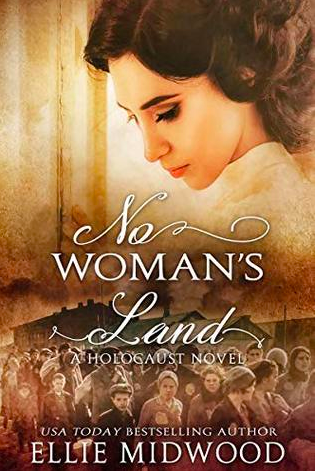
This novel is based on the inspiring and moving love story of Ilse Stein, a German Jew, and Willy Schultz, a Luftwaffe Captain in the Minsk ghetto, who risked his life to save the one he loved the most.
When the last of the Jews’ rights are stripped in 1941, Ilse’s family is deported to a Minsk ghetto. Confined to a Sonderghetto and unable to speak the locals’ language, Ilse struggles to support the surviving members of her family. Befriended by a local underground member Rivka, Ilse partakes in small acts of resistance and sabotage to help her fellow Jews escape to the partisans.
A few months later, after losing almost his entire brigade of workers to one of the bloodiest massacres conducted by the SS, a local administrative officer Willy Schultz summons the survivors to form a new brigade. Ilse’s good looks immediately catch his eye, and he makes her a leader of the new unit and later, an office worker. Soon, an unlikely romance blossoms amid death and gore, moving a Nazi officer to go to great risks to protect not only Ilse but as many others as possible and allowing a Jewish girl to open her heart to the former enemy. Knowing that the ghetto would soon be liquidated, Willy Schultz swears to save Ilse, even if the cost would be his own life.
“We live together, or we die together,” - an ultimate oath of love in the most harrowing setting.
Dark, haunting, but full of hope, “No Woman’s Land” is a testament to the love that is stronger than fear and death itself.
Excerpt
We looked at each other for a long time without speaking. A radio was playing softly in the background. Zarah Leander was singing about love. I suddenly recalled an anecdote that women used to discuss with such delight at the parachute factory in Frankfurt. Reportedly, Minister of Propaganda Dr. Goebbels once asked the Swedish actress if Zarah was a Jewish name, to which she wittily replied, ‘and what about Josef?’ Dr. Josef Goebbels chuckled at the jest and signed her up with the UFA, a major German film company. She became an instant success.
I smiled dreamily at the memory. I was free then. Free to walk the streets and sneak inside the cinemas even. Free…
“What is it?” Schultz mirrored my grin.
He wanted to hear the story that made me smile. He wished to be a part of my world but that part was long gone and dead and there was nothing to tell any longer.
“Why do you want to kill us all?” I asked him instead.
He pulled back slowly, blinking at me in astonishment. “Why would you say that? I don’t want to kill anyone.”
I outstretched my hand. My index finger stopped within centimeters from his Party pin. I’d never touch it. Even the mere thought of it was repulsive. “This… thing; it says that you do.”
“It’s just a harmless pin.”
“Yes, it is. It may be harmless on its own but every single person, who took every tiny bit of our rights, wore one. The new director at my school, who made me sit in the back; SA troopers who trashed Papa’s grocery in 1938; Gestapo agents, who came to our apartment and gave Papa an order for our resettlement; the office clerk who gave me the blank in which I had to sign that my German nationality lapses and I become a stateless person.” I shrugged. “It takes a village to kill a Jew,” I finished, purposely distorting the saying.
I half-expected for him to order me out and never to come back. To start protesting and defending his position perhaps, explain that “certain things that a young girl like myself didn’t understand,” talk politics and what not. Instead, Schultz reached for the pin and slowly undid it, pulled it out of the cloth leaving a narrow hole in its place and lowered it onto the table.
“Better?”
When I didn’t reply anything – I really didn’t know what to say – he pulled the top-drawer open, swiped the pin into it and closed it again.
“Are you planning on taking it off and hiding it every time I come here?” I felt a ghost of a grin growing on my face again.
“No. I plan never to wear it again. It should make things easier, don’t you think?” “Won’t you get in trouble?”
“I’d rather risk the wrath of my superiors than yours.”
“I’m not in a position to threaten you with my wrath, as you call it.”
“Perhaps not openly. But sometimes you give me one of those hateful looks, and I wish for the ground to open up and swallow me. You have very expressive eyes, you know.”
“I don’t hate you.”
“Sometimes you do.”
“It’s the uniform that I hate, not you.”
He was suddenly unbuttoning his jacket. Under my uncomprehending gaze, he promptly removed it, folded it inside out to hide the insignia and flattened it over his lap.
“There. Ordinary civilian shirt. Happy?”
“Yes.”
“Thank God. I thought you’d make me strip bare, for a moment there.”
I almost succeeded in hiding a smile. He almost succeeded at hiding his too… almost.
The Coffee Pot Book Club★★★★★ Highly RecommendedRead the full review HERE!

Pick up your copy of
No Woman's LandAmazon UK • Amazon US
Ellie Midwood
 Ellie Midwood is an award-winning, best-selling historical fiction writer. She's a health-obsessed yoga enthusiast, a neat freak, an adventurer, Nazi Germany history expert, polyglot, philosopher, a proud Jew, and a doggie mama.
Ellie Midwood is an award-winning, best-selling historical fiction writer. She's a health-obsessed yoga enthusiast, a neat freak, an adventurer, Nazi Germany history expert, polyglot, philosopher, a proud Jew, and a doggie mama.Ellie lives in New York with her fiancé and their Chihuahua named Shark Bait.
Awards:
Readers' Favorite - winner in the Historical fiction category (2016) - "The Girl from Berlin: Standartenführer's Wife"
Readers' Favorite - winner in the Historical fiction category (2016) - "The Austrian"(honorable mention)
New Apple - 2016 Award for Excellence in Independent Publishing - "The Austrian"(official selection)
Readers' Favorite - winner in the Historical fiction category (2017) - "Emilia"
Readers' Favorite - winner in the Historical fiction category (2018) - "A Motherland's Daughter, A Fatherland's Son"
Connect with Ellie:
Website • Amazon • Goodreads • BookBub • Facebook.
Published on May 31, 2019 18:30
May 30, 2019
Join me in conversation with #HistoricalFiction author, Rebecca Rosenberg. There is also a chance to win some great prizes! #Giveaway @RebeccasNovels @hfvbt
Historical Fiction Virtual Blog Tour Presents...
Gold Digger
By Rebecca Rosenberg

One look at Baby Doe and you know she was meant to be a legend! She was just twenty years old when she came to Colorado to work a gold mine with her new husband. Little did she expect that she’d be abandoned and pregnant and left to manage the gold mine alone. But that didn’t stop her!She moved to Leadville and fell in love with a married prospector, twice her age. Horace Tabor struck the biggest silver vein in history, divorced his wife and married Baby Doe. Though his new wife was known for her beauty, her fashion, and even her philanthropy, she was never welcomed in polite society.Discover how the Tabors navigated the worlds of wealth, power, politics, and scandal in the wild days of western mining.Praise for Gold Digger
“Rosenberg’s rollicking Western adventure strikes gold with a gutsy, good-hearted spitfire of a heroine and action aplenty.”THELMA ADAMS, bestselling author of Bittersweet Brooklyn and The Last Woman Standing“Gold Digger tells the true story of Lizzie ‘Baby Doe’ Tabor, a beautiful young woman who in 1878 marries the son of a wealthy miner in order to save her family from penury. Shrewd and stubborn, Lizzie fights back-biting Victorian society, wins and loses vast fortunes, and bests conniving politicians in her larger-than-life story. A twisting tale worthy of Mark Twain, with a big-hearted heroine at the center.”
MARTHA CONWAY, author of The Underground River.
A Conversation with Rebecca Rosenberg
Please give a warm Coffee Pot welcome to Historical Fiction author, Rebecca Rosenberg.
Hello everyone! If we haven’t met, I’m Rebecca Rosenberg, author of my new novel, GOLD DIGGER, The Remarkable Baby Doe Tabor.
I live on a lavender farm in Sonoma, California. When I am not reading and writing, I am playing mahjong or learning more about champagne for my upcoming book, Champagne Widows. (Somebody has to do it!)
 Rebecca Rosenberg and Baby Doe Tabor.
Rebecca Rosenberg and Baby Doe Tabor.It is so nice to meet you, Rebecca. Let’s get straight down to business…! What inspired you to write GOLD DIGGER, the Remarkable Baby Doe Tabor?
I grew up in California and Colorado, camping in the mountains, exploring ghost towns, panning for gold in rivers. As a girl, I read brochures about Baby Doe Tabor’s life and became obsessed with this twenty-year old who came west for a gold mine with her husband who abandoned her. She ended up pregnant and working the gold mine alone. Then meeting, an old prospector, twice her age and married, who strikes it rich on the biggest silver vein in history…I knew I had to tell her story as it had never been told before. Society branded her a GOLD DIGGER, but she proved her loyalty and grit to the very end of her life.
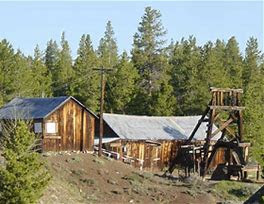 The Matchless Mine is located in Lake County, Colorado.
The Matchless Mine is located in Lake County, Colorado.What a remarkable life Baby Doe Tabor had, I am not surprised you wanted to tell her story. What were the challenges you faced in researching this period of history?
The period of the gold and silver rushes in America is well documented. Baby Doe and Horace Tabor’s papers are at HISTORY COLORADO and I have spent a few days reading and copying the great parts of these papers. It is amazing that readers can still visit so many important places of the Tabors and really get a feel for the times they lived. Leadville, Colorado is where the Tabors met and it is like a living museum of the gold/silver rush. I wrote a couple of weeks there by myself, as well as research trips to the National Mining Museum (Leadville), a sprawling and truly amazing museum with actual-size exhibits, rare mineral display, impressive miniature mining models. In Leadville, you can visit the Silver Dollar Saloon, the Tabor House and even the Tabor Opera House. The history is living all around you! It was harder in Denver where all the Tabor’s property has been torn down. But, in Washington D.C., where Tabor was U.S. senator, you can have a Gibson cocktail at the Round Robin bar just like Tabor and President Arthur had. I love research!
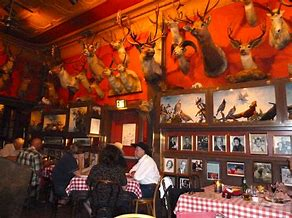 Buckhorn Exchange
Buckhorn ExchangeWhat an amazing period to research. There are many books about the Wild West. Can you tell us three things that set your novel apart?
I feel like there are many, many more novels about World War II and the twentieth century, not so much the nineteenth century, like Gold Digger. #1. I feel that Americans will enjoy learning their history, after all, these are our ancestors who did amazing things that we do not usually think about. There is a lot to be learned from them. From Gold Digger, I have learned that money runs out due to no fault of your own! For the Tabor’s that was the U.S. demonetizing silver. For me, it was the California fires, destroying my home and it costing twice what it should to rebuild!
#2. I like to write about real women and the grit and spirit they had to live in an atmosphere where women had no rights at all, Not even the right to vote, until 1920.
#3. Many I always like stories where you can go visit the actually places where the story happened. When Celestine Prophecy came out, I visited Peru! When Twin Peaks was popular on television, we went to Snoqualmie, Washington to have cherry pie and coffee at their café. With Gold Digger you can see so many real places and understand the story! And even if you don’t visit, there are many websites to visit and get more information.
Thank you for stopping by for a chat today! Before you leave, can you tell us what are you currently working on?
I am working on the third draft of CHAMPAGNE WIDOWS, the first book of the series. When I finish the fifth draft, I’ll send it to my publisher, LAKE UNION. Then, I’ll get to work on polishing the sequel to Gold Digger, SILVER DOLLAR (Baby Doe’s daughter!)
Giveaway
During the Blog Tour, we will be giving away a copy of Gold Digger, a gold facial mask & soap set, and recipe brochure to five winners. Three winners will receive an ebook of Gold Digger. You can enter HERE!Giveaway Rules• Giveaway ends at 11:59 pm EST on June 28th. You must be 18 or older to enter.
• Giveaway is open INTERNATIONALLY.
• Only one entry per household.
• All giveaway entrants agree to be honest and not cheat the systems; any suspicion of fraud is decided upon by blog/site owner and the sponsor, and entrants may be disqualified at our discretion.
• The winner has 48 hours to claim prize or new winner is chosen.
Pick up your copy ofGold DiggerAmazon UK • Amazon US • Barnes and Noble
Rebecca Rosenberg
A California native, Rebecca Rosenberg lives on a lavender farm with her family in Sonoma, the Valley of the Moon, where Jack London wrote from his Beauty Ranch. Rebecca is a long-time student of Jack London’s works and an avid fan of his daring wife, Charmian London. The Secret Life of Mrs. London is her debut novel.Rebecca and her husband, Gary, own the largest lavender product company in America, selling to 4000 resorts, spas and gift stores. The Rosenbergs believe in giving back to the Sonoma Community, supporting many causes through financial donations and board positions, including Worth Our Weight, an educational culinary program for at-risk children, YWCA shelter for abused women, Luther Burbank Performing Arts Center to provide performances for children, Sonoma Food Bank, Sonoma Boys and Girls Club, and the Valley of the Moon Children’s Home.For more information, please visit Rebecca’s website and blog. You can also find her on Facebook and Goodreads. Visit the Facebook page for The Secret Life of Mrs. London.

Published on May 30, 2019 23:00
The Coffee Pot Book Club Book Cover of the Month for May is — Killing The Hangman by Ellie Midwood #HistoricalFiction #BookCover
The Coffee Pot Book ClubBook Cover of the MonthGoes to...

Killing The HangmanBy Ellie Midwood
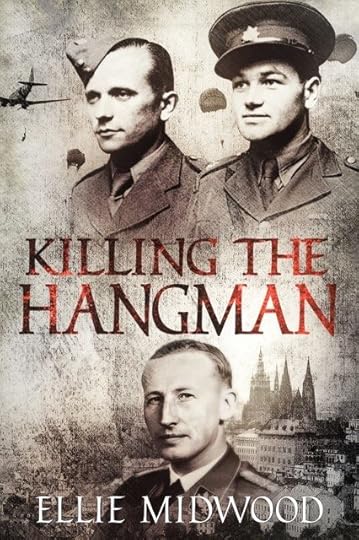
The most feared man of the Nazi elite.
Two Czechoslovakian patriots who are ready to risk their own lives to stop him.
The most daring assassination of WW2.
“You are tasked with a mission of the utmost importance. As you know, Reich Protector Reinhard Heydrich is one of the most powerful men in Nazi Germany as of now. He’s efficient in his methods, ruthless, extremely intelligent, and can’t be underestimated. A man like him will give you only one chance to kill him; if you don’t use it, he’ll kill you and it won’t be a fast and merciful death.”
The Gestapo chief and the man, whom Hitler himself calls The Man with the Iron Heart, arrives in Prague and soon earns himself the name of The Hangman among its population. When the order comes from London calling the Czech resistance to assassinate Reinhard Heydrich, they have to decide fast, what is stronger - self-preservation or heroic death in the name of freedom.
“We can’t die tonight. Fate wouldn’t allow us to die before we complete our mission. Heydrich’s appointment as the Protector has perverted the very sense of the word. He’s not the Protector; we are. We are coming to restore the correct order of things, how they should be. When the strong protect the weak, not when the strong bully everyone who goes against them into blind submission, or hangs them regardless of age, sex, class or origin. No, we can’t die. Otherwise, this whole world won’t make sense to me anymore.”
Based on true events, “Killing the Hangman” follows Josef Gabčík’s and Jan Kubiš’s training in Britain, their parachute drop into Czechoslovakia, and the eventual planning and carrying out of the assassination itself. It also provides an intimate glimpse into the life of Heydrich himself, his recent appointment, the infamous Wannsee Conference, and his eventual death.
Pick up your copy of Killing the HangmanAmazon UK • Amazon US
Congratulations, Ellie!

Ellie Midwood
 Ellie Midwood is an award-winning, best-selling historical fiction writer. She's a health-obsessed yoga enthusiast, a neat freak, an adventurer, Nazi Germany history expert, polyglot, philosopher, a proud Jew, and a doggie mama.
Ellie Midwood is an award-winning, best-selling historical fiction writer. She's a health-obsessed yoga enthusiast, a neat freak, an adventurer, Nazi Germany history expert, polyglot, philosopher, a proud Jew, and a doggie mama.
Ellie lives in New York with her fiancé and their Chihuahua named Shark Bait.
Awards:
Readers' Favorite - winner in the Historical fiction category (2016) - "The Girl from Berlin: Standartenführer's Wife"
Readers' Favorite - winner in the Historical fiction category (2016) - "The Austrian"(honorable mention)
New Apple - 2016 Award for Excellence in Independent Publishing - "The Austrian"(official selection)
Readers' Favorite - winner in the Historical fiction category (2017) - "Emilia"
Readers' Favorite - winner in the Historical fiction category (2018) - "A Motherland's Daughter, A Fatherland's Son"
Connect with Ellie:
Website • Amazon • Goodreads • BookBub • Facebook.

Killing The HangmanBy Ellie Midwood

The most feared man of the Nazi elite.
Two Czechoslovakian patriots who are ready to risk their own lives to stop him.
The most daring assassination of WW2.
“You are tasked with a mission of the utmost importance. As you know, Reich Protector Reinhard Heydrich is one of the most powerful men in Nazi Germany as of now. He’s efficient in his methods, ruthless, extremely intelligent, and can’t be underestimated. A man like him will give you only one chance to kill him; if you don’t use it, he’ll kill you and it won’t be a fast and merciful death.”
The Gestapo chief and the man, whom Hitler himself calls The Man with the Iron Heart, arrives in Prague and soon earns himself the name of The Hangman among its population. When the order comes from London calling the Czech resistance to assassinate Reinhard Heydrich, they have to decide fast, what is stronger - self-preservation or heroic death in the name of freedom.
“We can’t die tonight. Fate wouldn’t allow us to die before we complete our mission. Heydrich’s appointment as the Protector has perverted the very sense of the word. He’s not the Protector; we are. We are coming to restore the correct order of things, how they should be. When the strong protect the weak, not when the strong bully everyone who goes against them into blind submission, or hangs them regardless of age, sex, class or origin. No, we can’t die. Otherwise, this whole world won’t make sense to me anymore.”
Based on true events, “Killing the Hangman” follows Josef Gabčík’s and Jan Kubiš’s training in Britain, their parachute drop into Czechoslovakia, and the eventual planning and carrying out of the assassination itself. It also provides an intimate glimpse into the life of Heydrich himself, his recent appointment, the infamous Wannsee Conference, and his eventual death.
Pick up your copy of Killing the HangmanAmazon UK • Amazon US
Congratulations, Ellie!

Ellie Midwood
 Ellie Midwood is an award-winning, best-selling historical fiction writer. She's a health-obsessed yoga enthusiast, a neat freak, an adventurer, Nazi Germany history expert, polyglot, philosopher, a proud Jew, and a doggie mama.
Ellie Midwood is an award-winning, best-selling historical fiction writer. She's a health-obsessed yoga enthusiast, a neat freak, an adventurer, Nazi Germany history expert, polyglot, philosopher, a proud Jew, and a doggie mama.Ellie lives in New York with her fiancé and their Chihuahua named Shark Bait.
Awards:
Readers' Favorite - winner in the Historical fiction category (2016) - "The Girl from Berlin: Standartenführer's Wife"
Readers' Favorite - winner in the Historical fiction category (2016) - "The Austrian"(honorable mention)
New Apple - 2016 Award for Excellence in Independent Publishing - "The Austrian"(official selection)
Readers' Favorite - winner in the Historical fiction category (2017) - "Emilia"
Readers' Favorite - winner in the Historical fiction category (2018) - "A Motherland's Daughter, A Fatherland's Son"
Connect with Ellie:
Website • Amazon • Goodreads • BookBub • Facebook.
Published on May 30, 2019 08:09
May 29, 2019
A conversation with Historical Fiction author, Iris Yang #amwriting #HistoricalFiction @IrisYang86351
A conversation with Historical Fiction author, Iris Yang.

Welcome back to Myths, Legends, Books & Coffee Pots, Iris! What have you been up to since last we saw you?
In 2018, I achieved every writer’s dream—my novels were accepted for publication by Open Books. The first novel, Wings of a Flying Tiger, was published in June 2018, and its sequel, Will of a Tiger, was released in January 2019. Both books have received glowing reviews and have been featured in a dozen newspapers.
Recently I was interviewed on National Public Radio’s “The State of Things”—
“She infuses real-life events with her personal family history stories from a very dark period in China’s history”Listen to the full interview here!
I was an invited speaker at the Authors Festival 2019 at Octavia Fellin Public Library in Gallup, NM. I’ve been invited to attend the Flying Tigers WWII Veterans Reunion in San Diego September 25-29, 2019.
Wow! You have been busy. If we may talk about your fabulous books for a moment, I was wondering if you plan to write Will of a Tiger when you wrote Wings of a Flying Tiger?
No, I didn’t. I started writing this book several months after I finished Wings of a Flying Tiger. During that time, I kept on thinking and imagining what might have happened to the characters in the first book after their rescue of Danny Hardy, the American pilot. Those characters became so real to me that I wanted to know how their lives turned out to be. So, I started researching, not only about the War Against Japan, but also Chinese history afterwards.
The more I learned about the survivors of war, the more I realized how much adversity they had faced, especially for someone like Birch Bai. Surviving the War Against Japan might have been the beginning of his long battle. On top of physical disability, emotional pain, and survivor’s guilt, he had to deal with the dreadful political reality—the Chinese Civil War and the separation of the country.
Your books have a strong military influence. Were you from a military family?
No, I didn’t have any military experience. Nor did most of my family. However, my grandfather, Yang Duanliu, served as the Director of the Audit Office of the Central Military Commission in mid 1930s. He was an economist and a professor at Wuhan University. Because of his immenseknowledge in economics, he had given lectures to Chiang Kai-shek, the leader of the Republic of China. He was the only admiral who was allowed to wear plain clothes in the Nationalist Military. When I wrote General Bai, I thought of my grandfather: gentle, intelligent, principled, and disciplined.
Your grandfather sounds like an amazing man. What drew you to write stories set in the backdrop of war?
My mother asked me a similar question when I was young. She was curious about why a quiet, shy girl liked to read books about war. I didn’t have any answers at the time. I didn’t even know the reason. Now looking back, I can see it clearly. I was born a very shy and fearful person. I was afraid of pretty much everything—darkness, height, insects, snakes, strangers, public speaking... It was because of my shyness and fear that I loved reading wartime stories. I looked up to heroes. I admired their courage and their spirit. I read books about those extraordinary people so that I could be inspired by their heroic acts and hopefully learn from them.
Growing up in a family of professors, I’ve always loved reading. Even before I was born, my parents and grandparents had bought books for me. However, during the Cultural Revolution, the Red Guards came to our home and took most of the books away. I read the few leftovers again and again because there weren't many books available—for almost ten years the libraries were closed and the bookstores had nothing except political works. You can’t imagine how hungry I was for books!
But I was lucky to have a wonderful father. My hometown, Wuhan, is one of the “Three Furnaces” in China. We had no air conditioning or electric fans. In the hot and humid summer evenings, we sat outside. Surrounded by neighboring kids, my father told us stories—from Chinese masterpieces to Western classics, including some of the most heroic tales such as Romance of the Three Kingdoms, Water Margin, The Great General Yue Fei, and Spartacus. Those summer nights influced me in many ways.
So as a writer, I write what I love to read: heroic tales with touching love stories. And I’m happy to say that I’m no longer a shy or fearful person. I have a private pilot license, and my admiration for the fighter pilots was clearly conveyed in my books.
Thank you for taking the time to speak to us today. Would you mind if we took a look at Will of a Tiger?
Of course!
Will of a Tiger

In 1942, Birch Bai, a Chinese pilot, and Danny Hardy, a downed American pilot, become sworn brothers and best friends.
In the summer of 1945, both airmen’s planes go down in Yunnan Province of China during one of many daring missions. They are captured, imprisoned, and tortured by the Japanese for information about the atomic bomb. Just days before the end of WWII, Danny makes an irrevocable decision to save Birch's life.
For Birch, surviving the war is only the beginning of the battle. He must deal with the dreadful reality in China—the civil war, the separation of the country, the death of one friend in the Communist-controlled Mainland and another under the Nationalist government, and his wrongful imprisonment in Taiwan.
From Chungking to Yunnan, and from Taiwan to San Francisco, the sequel to Wings of a Flying Tiger takes readers along on an epic journey.
Pick up your copy ofWill of a TigerAmazon UK • Amazon US
Iris Yang
 Iris Yang, Ph.D. (Qing Yang) was born and raised in China. She has loved reading and writing since she was a child, but in China creative writing was a dangerous career. As famous writers and translators, her grandmother and her aunt were wrongfully accused as counter-revolutionary Rightists, so Iris had to choose a safer path—studying science.
Iris Yang, Ph.D. (Qing Yang) was born and raised in China. She has loved reading and writing since she was a child, but in China creative writing was a dangerous career. As famous writers and translators, her grandmother and her aunt were wrongfully accused as counter-revolutionary Rightists, so Iris had to choose a safer path—studying science.After graduating from Wuhan University and passing a series of exams, she was accepted by the prestigious CUSBEA (China-United States Biochemistry Examination and Application program). At age 23, with poor English, little knowledge of the country, and 500 borrowed dollars, she came to the United States as a graduate student at the University of Rochester.
Later, she received a Ph.D. in molecular biology, trained as a postdoctoral fellow at Cold Spring Harbor Laboratory, and worked at the University of North Carolina. Although she has published a number of scientific papers, she has a passion for creative writing, and her short stories have won contests and have been published in anthologies. Her debut novel, Wings of a Flying Tiger, has been published in June, 2018, and its sequel, Will of a Tiger, has been published in January, 2019. Currently, Iris is working on a story based on her grandmother, who was the first Chinese woman to receive a master’s degree in Edinburgh in the UK. Iris now lives between Sedona, Arizona and Chapel Hill, North Carolina. Besides writing, she loves hiking, dancing, photography and travel, and she holds a private pilot license.
Connect with Iris: Website • Facebook • Twitter.
Published on May 29, 2019 23:00
May 28, 2019
Join me in conversation with Thomas Cardwell, Narrator of The Red Flag by Julia Maiola #HistoricalFiction #AudioBooks @tdgcardwell @CaptainMaiola
A conversation with Thomas Cardwell, Narrator of The Red Flag
By Julia Maiola

Captain Stephen Boswell sails under the red flag, a symbol of no mercy. It’s the only reason he has lived this long. The only reason the Navy has not found him yet. But they are closing in. And if they catch him, they will execute him for piracy.
Ten-year-old Alice Bradford doesn’t know why she is alive. When Captain Boswell found her hiding on his ship, she expected him to kill her, and it seemed his own crew had expected likewise. But now she is his prisoner and she fears that she will be forever. Somehow, though, it seems that the captain might be more afraid of the Navy than she is of him. Something from his past has him ill at ease, Alice realizes. Even if the Navy cannot bring him to his knees, his own paranoia will. A gripping, fast-paced story about one of the last pirates of the Golden Age of Piracy and his fight for survival.
Hi Thomas, welcome to Myths, Legends, books and Coffee Pots… It is so wonderful to have you on the blog. How did you get into Audiobook Narration?
Well, it probably started when I was little. My Dad would read stories to me. He would always give all the characters their own individual voices and bring the story to life. Since then I’ve primarily worked in Theatre, often musicals, Shakespeare, or Children’s theatre - I always enjoy the challenge of playing multiple characters in the same show, finding ways to make them into different, believable people. I’ve also previously done a little announcing type voice work, and then really started audiobook narrating at the end of 2018.
How is audiobook narration different from other acting?
I’d say the biggest two differences are: First, the number of different characters you play. I think the most different people I’ve played in one show was about seven, in ‘Bloody Bloody Andrew Jackson’. In most plays though, I’ll only play one person, or at most two or three. Compare that with at least 35 different characters in ‘The Red Flag’! Secondly, you get to play a wider range of characters, because you portray all of them, including ones you have no physical resemblance to - for example Alice Bradford. And then, of course, you’re using your voice to create not just those characters, but also the world of the story for the listener too, which is a fun challenge.
What attracted you to working on this project?
I’ve always had an interest in Pirates – Muppet Treasure Island was one of favorite films as a kid. I’ve played a pirate before in a stage adaption of the book, ‘How I Became a Pirate’ (and also the holiday themed sequel, ‘Jingle Argh the way!’) Julia’s approach to the historical accuracies of the time period drew me in too. I also really enjoyed the way the story is essentially told through the eyes of both Boswell and Alice.
Do you have any other experiences with Historical fiction?
I’ve performed and directed quite a few plays by Shakespeare, if they count as historical fiction? I’ve adapted Dracula into a Family Friendly Musical Comedy and have also adapted one and a half Sherlock Holmes stories into plays. (One of those has been produced, the other one I’m still working on… hence one and a half.) In terms of narrating work, that leads into the last question…
What’s next for you?
I’m looking forward to the release of my latest audiobook ‘The Mysterious Affair at Styles’ which I’ve just completed my narration work for. Hercule Poirot was a fun character to take on!
Pick up your audio copy of
The Red Flag
Audible UK • Audible US
About the Narrator
 Thomas Cardwell is a fearlessly silly actor with a giggle that could turn lead to gold. With an almost accidental charm, he’s the Favorite Uncle, or the Goofball Best Friend. An International Man of Mystery, a part-time Pirate, and an occasional mustache-twirling villain. Also a Director and Writer, he co-founded EclecticPond Theatre Company in Indianapolis, and served as its Artistic Director for six years. Uncle to six incredible humans, Dog Dad to two fantastic pups, and Husband to one amazing lady.
Thomas Cardwell is a fearlessly silly actor with a giggle that could turn lead to gold. With an almost accidental charm, he’s the Favorite Uncle, or the Goofball Best Friend. An International Man of Mystery, a part-time Pirate, and an occasional mustache-twirling villain. Also a Director and Writer, he co-founded EclecticPond Theatre Company in Indianapolis, and served as its Artistic Director for six years. Uncle to six incredible humans, Dog Dad to two fantastic pups, and Husband to one amazing lady.Connect with Thomas Cardwell: Website• Twitter
Published on May 28, 2019 23:00
May 27, 2019
Join #HistoricalFiction author, Mercedes Rochelle, as she takes a look at the relationship between Richard II and John of Gaunt #History #Medieval @authorrochelle
Richard II and John of Gauntby Mercedes Rochelle
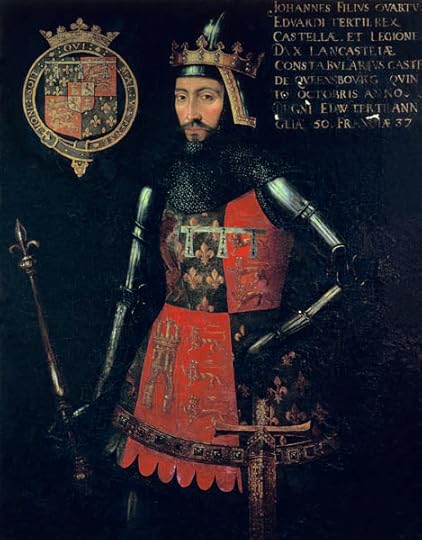
John of Gaunt with his coat of arms attributed to Lucas Cornelisz de Kock source: Wikipedia
Richard's relationship with his uncle, John of Gaunt was fraught with uncertainties and misunderstandings, though throughout it was bound by strict royal precepts. In retrospect, historians have noted that Gaunt's behavior showed he would never have done anything against the king's prerogative, no matter how he felt about him personally. But contemporaries—including the king himself—believed otherwise.
This misunderstanding went back to the reign of Edward III. In the old king's dotage, Gaunt increasingly took on his father's responsibilities in Parliament, though unlike Edward III, his conduct was overbearing and threatening. The magnates were so afraid that Gaunt might seize the throne for himself that on Edward's death they hurriedly crowned the 10 year-old Richard rather than risk a regency.
It's true that John of Gaunt was interested in a crown, but it was the crown of Castile he coveted, in right of his wife Constance. Ever since his marriage to her in 1371 he took on the title of King of Castile and León, and in 1386, circumstances permitted him to go to Spain and make a bid for his crown. He failed, but succeeded in a different way: John married his eldest daughter Philippa to the King of Portugal and his younger daughter Catherine to the future King of Castile. In return for giving up his claim to the Castilian throne, Gaunt accepted a huge payoff of 600,000 francs of gold which was paid in full over the next three years.
But before he took his family to Spain, John had some unpleasant run-ins with young King Richard. In 1384, there was the infamous scene where a Carmelite friar gained access to the king and told him that John of Gaunt was plotting to kill him. In a fit of rage, Richard ordered his uncle's execution and was only restrained by the urging of his wife and favorites. When an astonished Gaunt stumbled into this frantic scene he forcibly denied the accusation, giving Richard pause and turning all the attention onto the friar. No one ever found out what prompted this accusation, because the Carmelite died under torture that night. But for Richard, his own conduct cast serious doubts on his judgment. Some months later, after a bungled murder plot against Gaunt (planned by the king's friends), the duke confronted Richard in person and castigated him for permitting such despicable behavior in his court; he stopped short of accusing the king of involvement. Luckily, Richard's mother Princess Joan was still alive and able to smooth things between them.
The following year, there was a big ruckus between Richard and Gaunt over the upcoming campaign into Scotland. John wanted the king to invade France, but under heavy resistance from the chancellor and Richard's counselors, his advice was ignored. At first John stormed out of the council, exclaiming that he would have no part of the Scottish campaign. But he soon relented and brought a huge retinue with him, though the antagonism between him and the king would soon rise to the surface again. They fought bitterly once they reached Edinburgh and discovered that the Scots had withdrawn and ravaged Cumberland instead. John wanted to pursue them and Richard stoutly proclaimed that he wouldn't expose his army to hunger and deprivation for a pointless venture. It didn't help that his friend Robert de Vere implied that Gaunt hoped the king would meet with an accident along the way. Chase them if you want, Richard told his uncle, you have enough men. I'm going home. Once again, Gaunt gave in and assured the king he was his faithful servant and would follow where Richard would lead. It must have been very difficult for him to swallow his pride.

When the opportunity arose for Gaunt to try his luck in Spain, Richard was so thrilled he gave his uncle a royal send-off, presenting the Duke and Duchess with gold crowns. Finally, his uncle would be out of the way and Richard could rule on his own! Little did he realize that the Duke of Lancaster was the only power propping up his throne. Once Gaunt's formidable presence was removed, disgruntled magnates—led by Richard's youngest uncle, Thomas of Woodstock—quickly took his place. There was nothing to hold them back and they immediately went after Richard's advisors—starting with his chancellor, Michael de la Pole. Over the next two years, powerful nobles known as the Lords Appellantconspired to rid the king of his "bad counselors" and forced him to give up control of his government and accede to their leadership in all things. The judicial murder, outlawry, and dismissal of his friends and advisors left him completely alone and at their mercy. Luckily for the king, the Appellants failed to follow up on their victory. After a year, once it was evident that England was no better off than before, Richard was able to take back full control in a quick coup, reminding the Council that he was well past his majority.
One of the first things he did was recall Gaunt from the continent; Richard had learned his lesson and he needed his uncle's protection. Although the Duke of Lancaster still had much to accomplish, he obliged his nephew and returned to a hero's welcome from the king; never again would there be any serious antagonism between them. At the same time, Richard was forced to swallow any antipathy he might have felt against his cousin Henry of Bolingbroke, who was one of the Lords Appellant, albeit an unenthusiastic one. Any retribution against Henry would have to come later, after his father was dead.
It took several years for Richard to feel comfortable enough to launch his retribution against the Lords Appellant, and when it finally came about in 1397 it all happened like a cyclone. Richard's primary targets were Thomas of Woodstock the Duke of Gloucester (and Gaunt's younger brother), Richard Earl of Arundel, and Thomas Beauchamp Earl of Warwick. John of Gaunt, as Lord High Steward of England, presided over the Parliamentary trials of the king's great enemies. He was spared the litigation against his brother; Gloucester died mysteriously while in prison at Calais and Gaunt seems not to have made a fuss over it—at least not in public. Arundel, on the other hand, was a bitter enemy of Gaunt. Although he put up a lively defense, he was treated most harshly by the Duke of Lancaster. Bolingbroke threw in his two cents as well, reminding Arundel of treasonous statements—even though ten years previously he had been on Arundel's side.
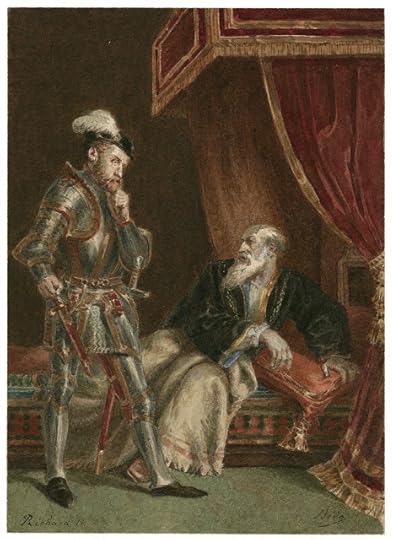 Richard visits Gaunt on his Deathbed, Watercolor by Alexandre Bida, Folger Shakespeare Library .
Richard visits Gaunt on his Deathbed, Watercolor by Alexandre Bida, Folger Shakespeare Library .But Henry of Bolingbroke would not escape the king's retribution. The following year Bolingbroke faced his fellow Appellant Thomas Mowbray in trial by combat at Coventry. This is another story, but suffice it to say that when the king interrupted the tournament (as portrayed by Shakespeare), he decided to exile both parties—Henry for ten years, and Mowbray for life. Richard made this announcement after consulting with his Council for two hours; Gaunt was among their number and gave his assent. Why did he do this? Some said he disapproved of his son, but I find little verification of this in his biographies. Perhaps he thought to send his son safely away from all the scheming and back-stabbing in Richard's court. Perhaps he had no choice. Regardless, Henry left the country with a heavy heart, for he knew he would probably never see his father again. And so it was; Gaunt died just a few months later.
It was said that King Richard visited Gaunt just before his end. Shakespeare had him gloating over the sick old man, but I don't think it happened that way. At least on the surface, he and his uncle had an amiable relationship the last several years. Once Gaunt was back on the scene, there was no way the Lords Appellant could start up their trouble-making again, and Richard knew it. I do believe he was waiting for his uncle to pass on before moving to his next agenda: eliminating the threat of the overpowerful Lancastrians. But that, too, is another story.
Read more about Richard II in Book 1 of The Plantagenet Legacy
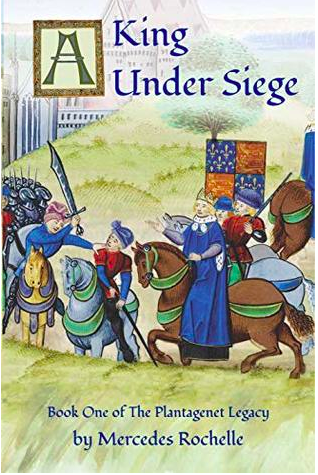
Richard II found himself under siege not once, but twice in his minority. Crowned king at age ten, he was only fourteen when the Peasants' Revolt terrorized London. But he proved himself every bit the Plantagenet successor, facing Wat Tyler and the rebels when all seemed lost. Alas, his triumph was short-lived, and for the next ten years he struggled to assert himself against his uncles and increasingly hostile nobles. Just like in the days of his great-grandfather Edward II, vengeful magnates strove to separate him from his friends and advisors, and even threatened to depose him if he refused to do their bidding. The Lords Appellant, as they came to be known, purged the royal household with the help of the Merciless Parliament. They murdered his closest allies, leaving the King alone and defenseless. He would never forget his humiliation at the hands of his subjects. Richard's inability to protect his adherents would haunt him for the rest of his life, and he vowed that next time, retribution would be his.
Pick up your copy ofA King Under Siege:Book one of the Plantagenet Legacy Amazon UK • Amazon US
Mercedes Rochelle
 Born in St. Louis MO with a degree from University of Missouri, Mercedes Rochelle learned about living history as a re-enactor and has been enamored with historical fiction ever since. A move to New York to do research and two careers ensued, but writing fiction remains her primary vocation. She lives in Sergeantsville, NJ with her husband in a log home they had built themselves.
Born in St. Louis MO with a degree from University of Missouri, Mercedes Rochelle learned about living history as a re-enactor and has been enamored with historical fiction ever since. A move to New York to do research and two careers ensued, but writing fiction remains her primary vocation. She lives in Sergeantsville, NJ with her husband in a log home they had built themselves.Connect with Mercedes: Website • Blog • Facebook • Twitter
Published on May 27, 2019 23:00
May 26, 2019
#HistoricalFiction author, Matthew Harffy, has a new book out in his fabulous series — The Bernicia Chronicles. Check out Storm of Steel today! #NewRelease #AngloSaxon @MatthewHarffy
Storm of SteelThe Bernicia Chronicles: Book #6By Matthew Harffy

AD 643. Anglo-Saxon Britain. A gripping, action-packed historical thriller and the sixth instalment in the Bernicia Chronicles.
Heading south to lands he once considered his home, Beobrand is plunged into a dark world of piracy and slavery when an old friend enlists his help to recover a kidnapped girl.
Embarking onto the wind-tossed seas, Beobrand pursues his quarry with single-minded tenacity. But the Whale Road is never calm and his journey is beset with storms, betrayal and violence.
As the winds of his wyrd blow him ever further from what he knows, will Beobrand find victory on his quest or has his luck finally abandoned him?
Excerpt
Beobrand had never known such terror and misery before that foul night.
His stomach clenched and heaved, but all he could manage to bring up was a thin string of spittle and bile. He hawked and spat into the leaden, opaque waves that caused the ship to list and roll.
The storm had caught Háligsteorra’s master ill-prepared and too far from the shelter and safety of land and they had been buffeted and blown far out into the North Sea. They had lost sight of their escort as the sky had grown bruised and full of anger. Sharp flickers of lightning had lit the white-fretted waves and the terrified faces of the men who clung to the fragile timbers of the ship as the furious sea crashed over its wales and thwarts. The winds had made the taut ropes thrum and the mast bend, despite the sail having been furled and secured.
To start with, Beobrand had looked to the master, an old, leathery-faced man who exuded confidence and experience, and had believed such a veteran seaman must surely know how to deal with the squall. But, as the wind-lashed, wave-soaking night had dragged on and after one hapless sailor, a young lad that had reminded Beobrand of Tondberct, had been washed overboard, to disappear into the dark ocean without so much as a scream to be heard over the roaring ire of the storm, Beobrand’s faith in the captain had waned. The ship had begun to rapidly fill with water and all of them had bailed out as quickly as they were able. More than once, Beobrand had puked into the hold as he had scooped the chill water out and flung it over the side.
Utta and the other Christ priests and monks lent their own energies to the task of trying to keep the vessel afloat. Utta even led them in prayer to their nailed god. Before he became overcome with sickness, Utta produced a flask of oil that he said had been given to him by Abbot Aidan of Lindisfarena.
“Our Father of the Holy Isle foretold this storm,” Utta said, his face white and his voice tremulous. “He told me to pour this oil upon the troubled waves and all would become calm.”
Everyone paused to watch as he trickled the holy oil over Háligsteorra’s side. But nothing happened. The wind continued to rock the ship terribly and the cold waters still sluiced over the sides.
Coenred smiled at Beobrand, perhaps trying to show he wasn’t scared. But his pallid skin and pinched features told the truth of it. He was fearful for his life and Beobrand thought no less of the monk for it. He had stood in the gut-spilt, stench-filled clamour of shieldwalls and had faced great swordsmen in deadly combat, but he was terrified, sure that this wind-tossed sea would send them all to their doom.
The Christ neither listened to the monks’ supplications nor paid heed to the magical oil. The storm did not abate and they were tossed about on the surface of the sea like a twig thrown into a rushing stream. The skipper wrestled with the steerboard until it came adrift from the frame that attached it to the side of the ship, leaving them adrift, at the mercy of the elements and the gods.
Beobrand pulled a large chunk of hacksilver from his pouch and threw it far out into the darkness. It winked as a flash of distant lightning caught it and then it vanished. He hoped that was a good sign and that the gods of the ocean had accepted his offering. Muttering the words so that none could hear over the raging torment of the night, he offered the gods the silver and the life of the boy who had looked like Tondberct. The boy was already dead, but perhaps his could be a sacrifice that would save his shipmates.
Whether it was Woden and his children, or the Christ god who responded to their desperate pleas, Beobrand knew not, but as the dawn painted the horizon like an iron sword blade, the storm’s vehemence fled. The waves began to lessen in their ferocity and Beobrand believed, for the first time since dusk, that they might actually survive.
“Sails ahoy!” shouted a voice and Beobrand pushed himself up from where he had been leaning over the side of the ship.
Peering into the early morning gloom, Beobrand at first saw nothing but endless foam-flecked waves. But then, as the ship rolled down once more into a gully between two peaks of water, he saw three dark-sailed ships cutting through the water towards them. The sail of the foremost ship was a dark blood red. These were not the vessels that had been escorting them southward.
“Those ships mean us no goodwill,” said the skipper. “They be raiders, or I’m a Waelisc man! The gods alone know how they have ridden out that storm.” He spat over the side. He scanned the horizon in all directions and Beobrand followed his gaze. There was no sign of their escort or land.
Beobrand pushed himself up. Bassus reached out his one arm, his right, and hauled Beobrand to his feet. Bassus looked old, his beard and hair rimed with white, as if salt from the sea had dried there. His face was the colour of week-old hearth ash.
“I hate sailing,” the giant warrior growled, “always have. The sea and the sickness is bad enough, now there are pirates too. Why couldn’t we have ridden? You know where you are with a horse.”
“Yes,” replied Beobrand, pausing to spit once more to clear his mouth of the sour taste of vomit, “for we never get attacked when we are on land, do we, old man?”
Bassus grunted.
“At least on land we can run away.”
Beobrand raised an eyebrow.
“But we never do, do we?”
Bassus appraised him for a moment, before offering him a thin grin.
“True, but if we get knocked down on land, we don’t sink and drown.”
“Then we must do our best not to get knocked down.”
Pick up your copy ofStorm of SteelAmazon
Catch up with The Bernicia Chronicles (6 Book Series)Amazon UK • Amazon US

Matthew Harffy
 Matthew Harffy lived in Northumberland as a child and the area had a great impact on him. The rugged terrain, ruined castles and rocky coastline made it easy to imagine the past. Decades later, a documentary about Northumbria's Golden Age sowed the kernel of an idea for a series of historical fiction novels. The first of them is the action-packed tale of vengeance and coming of age, THE SERPENT SWORD.
Matthew Harffy lived in Northumberland as a child and the area had a great impact on him. The rugged terrain, ruined castles and rocky coastline made it easy to imagine the past. Decades later, a documentary about Northumbria's Golden Age sowed the kernel of an idea for a series of historical fiction novels. The first of them is the action-packed tale of vengeance and coming of age, THE SERPENT SWORD.Matthew has worked in the IT industry, where he spent all day writing and editing, just not the words that most interested him. Prior to that he worked in Spain as an English teacher and translator. Matthew lives in Wiltshire, England, with his wife and their two daughters.
Connect with Matthew: Website • Facebook • Twitter.
Published on May 26, 2019 23:00
Check out author and historian, Caleb Howells, new book — King Arthur: The Man Who Conquered Europe #KingArthur #Arthurian #NewRelease @amberleybooks
King Arthur:
The Man Who Conquered EuropeBy Caleb Howells

Who was King Arthur? That question has puzzled researchers for hundreds of years, yet still, no consensus has been reached. However, whether it is concluded that he was a Celtic king or a Roman officer, or something in-between, there is one conclusion that virtually all investigators agree on: he was some kind of war leader who fought against the Saxons in Britain. This is a fair conclusion, but it misses ‒ or ignores ‒ something crucial. In the legends of Arthur, he engages in a monumental campaign into Europe and wages war against the Roman Empire. Few researchers even attempt to offer an explanation for this, most simply dismissing it as fiction. The few theories that have been offered to explain the historical origin of this part of the legend are invariably unconvincing and do not address the scale of Arthur's campaign in the legend.
In this book, the historical event behind this legend is revealed. Arthur's enemies are identified as real historical figures. Most importantly, the identity of the man who conquered Europe is discovered and it is shown exactly how he came to be known as King Arthur.
Searching for Arthur....
It can safely be said that one of the figures of legend and folklore who has been written about the most is King Arthur. As well as countless versions of the legend being told and retold, it seems that researchers are on a never-ending quest to discover the truth behind the legends. All of this investigating has done little, if anything, to change the consensus of scholars. All that is agreed is that Arthur, if he ever even really existed, was some kind of military leader who fought the Saxons during the late-fifth or early-sixth century. However, there is a very large part of the Arthurian legends which is almost never entertained as possibly being authentic. This is Arthur's campaign into Europe and war against the Romans.
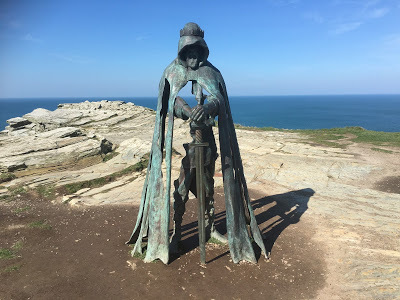 The King Arthur statue at Tintagel. The statue is called Gallos, which is Cornish for power. The sculpture is by Rubin Eynon.
The King Arthur statue at Tintagel. The statue is called Gallos, which is Cornish for power. The sculpture is by Rubin Eynon.While this aspect of the story does not appear in the earliest records of Arthur, it does appear in the first full account of Arthur's life, which is found in Geoffrey of Monmouth's Historia Regum Brittaniae. This describes how Arthur, after dominating all of Britain, decided to set out to conquer various parts of Europe, primarily Gaul (roughly modern-day France). After succeeding in this, several years pass and then, due to provocation from Rome, he mounts a campaign against the Romans themselves, beating them in battle at a valley called Siesia.
Arthur — A Legendary King?
The majority of scholars today consider this large part of the Arthurian legend to be totally fictional, Geoffrey of Monmouth having invented this account for one reason or another. However, there are some scholars who do attempt to offer a genuine explanation for this story. One popular theory is that it originated with a British king named Riothamus who, in c. 470, led an army against the Visigoths near central France. However, I have never found this theory to be very convincing, due to the extreme dissimilarity between this historical event and the Arthurian legend; in the former, Riothamus was working with the Romans and only engaged in one battle against his enemy, which he lost. In the latter, Arthur fought against the Romans and succeeded in conquering a huge portion of Europe.
Other explanations have been proposed at times, but they all fall short for the same reasons. They are too small scale. They never really match what happens in the Arthurian legend. Thus, an alternative explanation must be necessary. In my book, released on May 15, I present my case for the true origin behind this legend. Unlike all previous attempts, the explanation outlined in my book is able to explain each and every event involved in the tale of Arthur's European campaign. For example, the confrontation between Arthur and Frollo, a Roman tribune in command of Gaul, is tied down to a specific historical event. Arthur's complete conquest of Europe is covered, as is his final war against Rome itself.
The war against Rome...
In short, all of the events involved in Arthur's legendary war against Rome can be identified as historical events that took place during a genuine conquest of much of western Europe more than 1500 years ago. The main characters of the legend, such as the Roman tribune Frollo, Arthur's main enemy Lucius, and the Roman Emperor Leo are all identified as real, historical figures involved in this conquest. Most importantly, the central figure of Arthur himself is identified as a historical figure, and it is also shown where he appears in other British records under several different names...
To find out more Pick up a copy ofKing Arthur: The Man Who Conquered EuropeAmberley Publishing
Caleb Howells

Caleb Howells is an author from the south coast of England with a passion for discovering the truth behind the legends of King Arthur. He has spent years pursuing his dedicated interest in this topic and in other myths and legends from around the world.
Published on May 26, 2019 19:00
May 24, 2019
#BookReview — An Officer’s Vow (Gentlemen Book 2) by Penny Hampson #RegencyRomance @penny_hampson

An Officer’s Vow(Gentlemen Book 2)By Penny Hampson
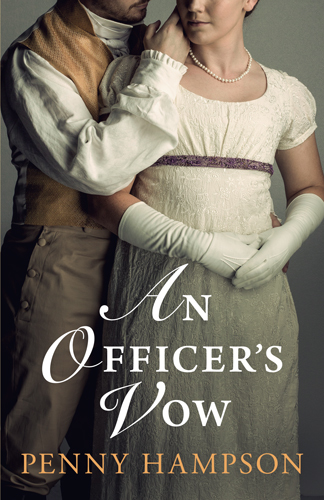
The future looks bleak to Major Nate Crawford. Depressed after being sent home from the Peninsular Campaign as unfit for service, he contemplates ending it all. Then an unexpected opportunity for adventure beckons in the shape of a delightfully intriguing runaway heiress. He will prove his worth as an officer and a gentleman by offering his help. He has a plan…Lottie Benham is desperate. Her life is in danger and she needs a place of safety until her next birthday. The unexpected proposal from this attractive, but intimidating officer could be the answer to her prayers. Not normally a risk-taker, she decides to gamble all by placing her trust in this charismatic gentleman, who she suspects might be more in need of help than she.But the best laid plans… Caught up in conflict, danger, and deception, will Lottie and Nate survive to find the perfect solution to their problems? An Officer’s Vow is the second in Penny Hampson’s Regency-set Gentlemen series, following the exploits and misadventures of a loosely linked group of friends.
Penny Hampson Writes History, Mystery, and… a touch of Romance.

“So you see, I had no option but to run…”
If she had stayed in her family home, Charlotte - Lottie - Benham would have been forced to marry her cousin. Cousin Jonah was the epitome of a blackguard. Jonah wants her money and nothing more. She even overheard him talking about having her put away in an asylum or worse after they were married. Lottie had no choice but to run.
Major Nate Crawford may have escaped with his life at the Battle of Talavera, but his life had been irrevocably changed forever. The extent of his injuries meant that he could no longer fight alongside his men. Instead, he had been forced to return home. His future looked bleak, and death seemed all too appealing.
It was during her desperate flight that Lottie crossed paths with Nate Crawford. She could not comprehend why Nate wanted to help her. It would be far easier if he left her to her fate. But words could not express how grateful she was for his understanding and assistance.
Lottie thought that it was Nate who was helping her, but Nate knew differently. She was, without knowing, helping him come to terms with his injuries. She was the medicine that he needed to realise that there was life outside of the army.
But... Cousin Jonah is still a threat to Lottie. He wants her money, and there is nothing he would not do to achieve his aims.
Filled with intrigue, danger, love and romance, An Officer’s Vow (Gentlemen Book 2) by Penny Hampson is a real treat for lovers of Regency Romance.
A born storyteller, Hampson has given us a tale that is as rich in historical detailing as it is in adventure. Hampson has presented us with a story that is impossible to resist and even harder to put down. I enjoyed every syllable, every word, and every sentence. The story is tautly gripping, and the romance is wonderfully tender.
I adored the characterisation of Nate. Hampson has presented us with a hero that is easy to fall in love with. He is honourable, kind, and so incredibly tender. The horrors that Nate has faced on the Peninsula haunt him, which I think gave his character depth. His struggle to come to terms with his injury was profoundly moving, and he had almost given up when Lottie stumbles into his life. Lottie gives Nate a sense of purpose and watching him fall in love with her made this one heck of an enthralling tale.
Lottie has been through so much, but she is no shrinking violet. She does not want to hide behind Nate. She wants to be able to stand on her own two feet, which made this Regency Romance refreshingly different from others that are out there. Nate’s struggle to balance Lottie’s desire for independence and his desire to keep her safe, certainly made for some interesting disagreements!
The romance between Lottie and Nate is a slow simmering build. This is very much a sweet romance, which really suited the story and these characters. Kudos, Ms Hampson.
If you are looking for your next Regency Romance, then I do urge you to check out Penny Hampson’s Gentlemen series. You won’t be disappointed.
I Highly Recommend.
Review by Mary Anne Yarde.The Coffee Pot Book Club.
Pick up your copy ofAn Officer’s VowAmazon UK • Amazon US
Penny Hampson
 Having worked in various sectors before becoming a full time mum, Penny Hampson decided to follow her passion for history by studying with the Open University. She graduated with honours and went on to complete a post-graduate degree.Penny then landed her dream role, working in an environment where she was surrounded by rare books and historical manuscripts. Flash forward nineteen years, and the opportunity came along to indulge her other main passion – writing historical fiction. Encouraged by friends and family, three years later Penny published her debut novel A Gentleman’s Promise.Penny lives with her family in Oxfordshire, and when she is not writing, she enjoys reading, walking, swimming, and the odd gin and tonic (not all at the same time).Connect with Penny: Website • Twitter
Having worked in various sectors before becoming a full time mum, Penny Hampson decided to follow her passion for history by studying with the Open University. She graduated with honours and went on to complete a post-graduate degree.Penny then landed her dream role, working in an environment where she was surrounded by rare books and historical manuscripts. Flash forward nineteen years, and the opportunity came along to indulge her other main passion – writing historical fiction. Encouraged by friends and family, three years later Penny published her debut novel A Gentleman’s Promise.Penny lives with her family in Oxfordshire, and when she is not writing, she enjoys reading, walking, swimming, and the odd gin and tonic (not all at the same time).Connect with Penny: Website • Twitter
Published on May 24, 2019 22:00
The Coffee Pot Book Club
The Coffee Pot Book Club (formally Myths, Legends, Books, and Coffee Pots) was founded in 2015. Our goal was to create a platform that would help Historical Fiction, Historical Romance and Historical
The Coffee Pot Book Club (formally Myths, Legends, Books, and Coffee Pots) was founded in 2015. Our goal was to create a platform that would help Historical Fiction, Historical Romance and Historical Fantasy authors promote their books and find that sometimes elusive audience. The Coffee Pot Book Club soon became the place for readers to meet new authors (both traditionally published and independently) and discover their fabulous books.
...more
...more
- Mary Anne Yarde's profile
- 159 followers



